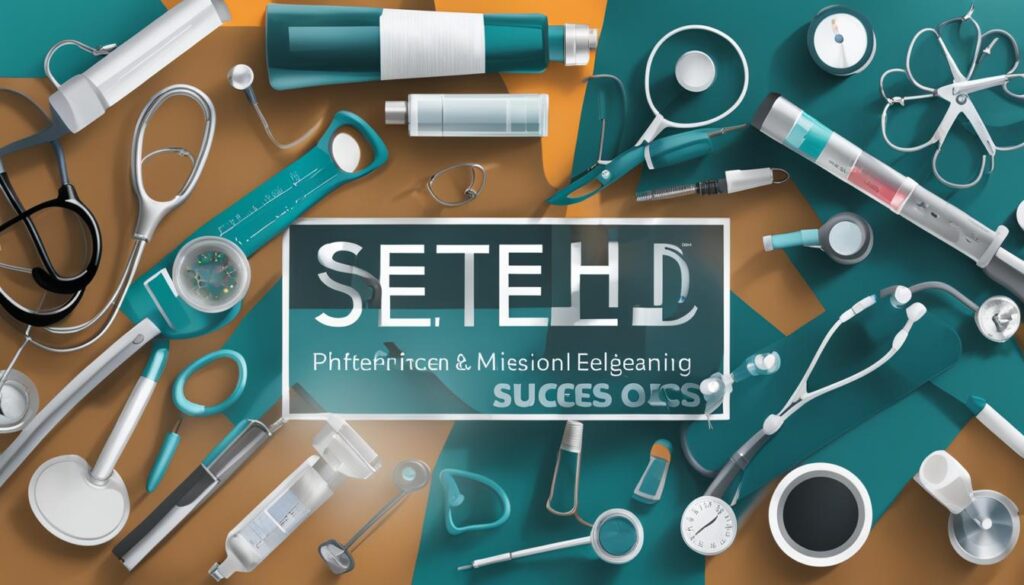PhD Education : Obtaining a Ph.D. in education is a unique and rewarding journey that combines rigorous academic study with research in the field of education. Whether you aspire to be a professor, a thought leader in education policy, or a researcher contributing to positive change in the field, a Ph.D. in education equips you with advanced knowledge and research skills to make a lasting impact.
In this article, we will explore the intricacies of Ph.D. education programs, including different program structures, specializations, and career pathways available to Ph.D. graduates. Through insights from current and former Ph.D. students, we aim to provide a comprehensive guide for those interested in pursuing a Ph.D. in education.
Key Takeaways: PhD Education
- Ph.D. education programs offer a unique blend of academic study and research in the field of education.
- Specializations and career pathways in Ph.D. education programs are diverse, spanning academia, education policy, and specialized fields.
- Insights from current and former Ph.D. students provide valuable guidance for prospective Ph.D. candidates.
- A Ph.D. in education equips individuals with advanced knowledge and research skills to contribute to positive change in the field of education.
- By pursuing a Ph.D. in education, you can make a lasting impact on society and become a leader in the field.
What Makes an MD-PhD Program Different?
One distinctive aspect of the MD-PhD program is the integration of medical education with research. Unlike traditional medical school programs, MD-PhD students spend the first two years in classes alongside their medical school peers. However, instead of transitioning directly to clinical rotations, MD-PhD students engage in research projects in a biomedical field of their choice.
These research projects offer a unique opportunity for students to gain hands-on experience in areas such as cancer research or HIV research. The choice of research project is often determined by the available resources and mentorship at the student’s institution.
“The MD-PhD program allowed me to delve deeper into my passion for cancer research while still acquiring the necessary medical knowledge,” says Dr. Emily Davis, a graduate of the program.
The MD-PhD program focuses on bridging the gap between scientific research and clinical practice, providing students with a comprehensive understanding of both fields. This multidisciplinary approach enables graduates to contribute to groundbreaking discoveries and advancements in medicine.
Why Choose an MD-PhD Program?
For aspiring medical professionals with a keen interest in research, an MD-PhD program offers a unique opportunity to combine their passion for both science and medicine. By completing rigorous training in medical school, MD-PhD students acquire the knowledge and skills necessary to become competent clinicians.
Simultaneously, their involvement in research projects allows them to contribute to the advancement of biomedically-related fields, such as cancer research or HIV research. By pursuing an MD-PhD program, students can make a significant impact on patient care and healthcare practices through their research endeavors and clinical expertise.
“Being part of an MD-PhD program has opened doors for me to explore the intersection of research and clinical practice. It has allowed me to make meaningful contributions to the field and improve patient outcomes,” explains Dr. Matthew Reed, an MD-PhD program graduate.
MD-PhD graduates often go on to become physician scientists, fulfilling vital roles in both medical practice and research. Their expertise in both areas positions them to tackle complex medical challenges, develop innovative treatment approaches, and drive advancements in the biomedically-related field.
Choosing a Specialization in an MD-PhD Program

When pursuing an MD-PhD program, students have the unique opportunity to choose a specialization that aligns with their interests and career goals. MD-PhD programs typically offer a range of departments and specializations within the broader field of biomedical research.
These specializations can include:
- Pathology
- Biochemistry
- Physiology
- Neuroanatomy
- Chemistry
While the specific departments may vary between institutions, it is important to select a specialization that relates to the student’s chosen field of biomedical research. This ensures that the program provides the necessary knowledge and skills to excel in their future career.
Each specialization offers unique opportunities for research and deeper exploration of a particular area of interest. For example, a student interested in studying the effects of diseases on tissues and organs may choose the pathology department. On the other hand, a student interested in understanding the chemical processes within living organisms may opt for a specialization in biochemistry.
The choice of specialization is a critical decision as it shapes the direction of the student’s research and future contributions to the medical field. Students should carefully consider their interests, goals, and the available resources and mentorship within each department before making their selection.
Selecting the Right Specialization
When choosing a specialization, it is essential to evaluate factors such as:
- Research opportunities: Assess the types of research projects available in each specialization and ensure they align with your research interests.
- Faculty expertise: Consider the expertise and mentorship provided by faculty members within each department.
- Career prospects: Research the career pathways and opportunities associated with each specialization to determine if they align with your long-term aspirations.
By selecting the right specialization, MD-PhD students can focus their research efforts and build the necessary expertise to make significant contributions to their chosen field.
A Spotlight on Chemistry
One specialization that holds immense potential for medical research is chemistry. While traditionally associated with the study of elements and compounds, chemistry plays a crucial role in understanding the complex chemical interactions within biological systems.
Integrating chemistry into an MD-PhD program allows students to explore the intersection of chemistry and biology, investigating how chemical processes can be harnessed for medical advancements.
Chemistry in medical research offers insights into drug discovery, pharmacology, and the development of innovative treatment methods. By understanding the chemical structures and reactions involved in biological processes, researchers can find novel solutions for combating diseases and improving patient outcomes.
Whether it’s analyzing drug interactions, studying the mechanisms of action, or developing targeted therapies, a specialization in chemistry equips MD-PhD students with a unique perspective and skill set that can drive forward medical research.
Inspiring Words
“The choice of specialization in an MD-PhD program can profoundly impact your research journey. It’s important to choose a specialization that excites you, aligns with your goals, and opens doors to new possibilities – a field where you can make significant contributions to scientific knowledge.” – Dr. Amanda Hernandez, MD-PhD graduate
Dr. Hernandez’s words highlight the significance of selecting the right specialization, emphasizing the impact it can have on a student’s research career.
Balancing Clinical Practice and Research in an MD-PhD Program

After completing both the medical school and research components of the MD-PhD program, graduates have the option to pursue a residency in a hospital and become a practicing clinician. Many MD-PhD graduates choose to blend their clinical practice with research, seeking careers as physician scientists. These individuals split their time between patient care and research activities, allowing them to apply their medical knowledge while contributing to advancements in their chosen field of research.
Comparison of Clinical Practice and Research in MD-PhD Programs
| Clinical Practice | Research | |
|---|---|---|
| Definition | The application of medical knowledge and skills in diagnosing and treating patients. | The systematic investigation of a subject to establish facts and reach new conclusions in the field of medicine. |
| Role | Providing direct patient care, making diagnoses, prescribing treatments, and monitoring patient progress. | Conducting experiments, analyzing data, publishing research findings, and contributing to scientific knowledge. |
| Focus | Improving individual patient outcomes, managing diseases, and delivering healthcare services. | Advancing medical knowledge, developing new treatments, and addressing scientific questions and challenges. |
| Skills | Clinical assessment, procedural skills, communication with patients, teamwork, and decision-making. | Laboratory techniques, data analysis, critical thinking, literature review, and scientific writing. |
MD-PhD graduates who balance clinical practice with research have the unique opportunity to bridge the gap between patient care and scientific advancements. This career path allows them to make a lasting impact on the well-being of individual patients while contributing to the broader medical knowledge base through research. It requires the ability to effectively manage time, prioritize responsibilities, and stay updated on the latest developments in both clinical practice and research.
By dedicating themselves to both clinical practice and research, MD-PhD graduates become physician scientists who play a vital role in driving healthcare innovation and improving patient outcomes. This dual expertise allows them to apply their medical knowledge and research skills in a synergistic way, ultimately shaping the future of medicine.
Skills and Traits for Success in an MD-PhD Program

In order to thrive in an MD-PhD program, students must possess a unique set of skills and traits that enable them to excel in both the medical and research aspects of the program. These skills and traits include:
- Attention to Detail: A keen attention to detail is crucial for planning experiments, collecting accurate data, and analyzing research findings. It is through meticulous attention to detail that MD-PhD students can ensure the validity and reliability of their research.
- Curiosity: Curiosity is a vital trait for MD-PhD students, as it drives them to ask insightful questions and explore innovative solutions. This intellectual curiosity allows students to think critically and creatively, pushing the boundaries of knowledge in their chosen field.
- Problem-Solving: Problem-solving skills are essential for MD-PhD students to tackle the complex challenges they encounter in both medicine and research. These skills enable students to devise innovative strategies, adapt to unexpected setbacks, and find solutions to intricate problems.
- Perseverance: The path to obtaining an MD-PhD is filled with obstacles and setbacks. Perseverance is crucial in overcoming these challenges and maintaining motivation throughout the program. It is through perseverance that students can navigate the rigorous demands of both medical school and research, ultimately achieving success.
- Intellectual Curiosity: Intellectual curiosity goes beyond a mere desire for knowledge; it encompasses a genuine passion for learning and a hunger to explore new frontiers. MD-PhD students with intellectual curiosity are driven to continuously expand their understanding of medicine and research, paving the way for groundbreaking discoveries.
- Work Ethic: MD-PhD students must possess a strong work ethic, as the program demands extensive dedication and commitment. They must be willing to put in the necessary time and effort to excel in both their medical studies and research endeavors.
By cultivating these skills and traits, MD-PhD students can strive for excellence in their academic pursuits, making significant contributions to the fields of medicine and research.
When to Start Preparing for College

College preparation is a crucial process that should begin early in a child’s development. By engaging in age-appropriate discussions about the importance of higher education, parents and educators can instill a mindset of academic ambition and future success. However, as students progress through high school, they should actively partake in activities that will help them navigate the college preparation journey. From visiting college campuses to attending tours and information sessions, these experiences can provide valuable insights into the college environment, student life, and available academic programs.
In addition to campus visits, participating in academic summer programs can significantly enhance a student’s preparation for college. These programs offer opportunities to explore academic interests, engage in challenging coursework, and experience college-level learning. By immersing themselves in a college campus setting, students can gain a deeper understanding of the academic expectations and demands they may encounter in the future.
An effective way to promote intellectual curiosity and independence is to expose students to various educational opportunities outside of traditional classroom settings. This can include visits to museums, attending music and theater performances, and engaging in community service. These experiences not only broaden their horizons but also foster a love for learning and personal growth.
“College preparation is not solely about academic excellence. It is also about helping students develop a sense of self, encouraging them to identify their passions, and providing guidance as they navigate the complex world of higher education.”
– Jane Thompson, College Admissions Counselor
Starting the college preparation process early allows students to make well-informed decisions about their future and explore different academic and career pathways. It is a transformative time that helps shape not only their educational journey but also their personal growth.
Benefits Description Enhanced Decision-Making Starting early allows students to carefully consider their college options, majors, and career paths, ultimately making well-informed decisions. Exploration of Interests By visiting college campuses and participating in summer programs, students have the opportunity to explore various academic interests and potential career paths. Academic Readiness Engaging in college-level coursework and experiences prepares students for the academic rigor they will encounter in college. Increased Self-Awareness Starting early allows students to develop a sense of self, exploring their strengths, weaknesses, and personal interests, paving the way for a fulfilling college experience.
Narrowing Down the College Search

When it comes to choosing the right college, there are several factors that students should consider. By narrowing down their options based on location, size, available majors, campus diversity, and the presence of Greek life, students can find the institutions that best align with their preferences and goals.
Location
The location of the college can greatly impact the overall college experience. Whether it’s a rural, suburban, or city setting, students should consider their personal preferences and how the location will contribute to their academic and social life.
Size
The size of the institution is an important consideration. Some students thrive in smaller, intimate settings where they can form close relationships with faculty and classmates. Others prefer the opportunities and resources available at larger universities. Choosing the right size can play a significant role in a student’s comfort and sense of belonging.
Available Majors
Students should explore the range of majors available at each college and ensure they offer programs that align with their areas of interest. It’s vital to have access to quality education in their intended field of study.
Campus Diversity
Diversity on campus fosters a rich and inclusive learning environment. Students should consider the representation of various cultures, ethnicities, and backgrounds in college communities to ensure exposure to different perspectives and experiences.
Greek Life
Greek life can be an important aspect of campus culture and social life for many students. It offers opportunities for leadership, community service, and networking. Students with an interest in joining a fraternity or sorority may want to consider the presence and activities of Greek organizations on campus.
To make an informed decision, students should create a personalized list of what matters to them in a college. Factors like proximity to home, campus atmosphere, academic support, and extracurricular opportunities should be considered. By exploring these aspects, students can narrow down their choices and find the colleges that meet their specific needs and aspirations.
Example:
| Factor | Considerations |
|---|---|
| Location | Rural, suburban, or city setting |
| Size | Small or large institution |
| Available Majors | Range of programs in the student’s area of interest |
| Campus Diversity | Representation of diverse cultures and backgrounds |
| Greek Life | Presence of Greek organizations and activities |
Choosing the right college is a crucial decision that can shape a student’s academic and personal journey. By considering factors like location, size, available majors, campus diversity, and Greek life, students can better identify the colleges that align with their individual preferences and goals.
Factors Considered by Colleges in Evaluating Applicants

When it comes to evaluating applicants, colleges take into account several key factors that go beyond academic achievements. Admissions officers aim to identify students who possess qualities and skills that will contribute to their success in college and beyond. Here are some of the factors that colleges consider:
- Intellectual Curiosity: Colleges value students who have a genuine love for learning and a thirst for knowledge. Intellectual curiosity demonstrates a passion for exploration and a willingness to go beyond the surface level of information.
- Independence: The ability to work independently and take initiative is highly regarded by admissions officers. Colleges seek students who can manage their time effectively, take responsibility for their learning, and actively seek out opportunities for growth.
- Ability to Manage Disappointment: College life is filled with challenges and setbacks. Colleges look for students who have demonstrated resilience and the ability to bounce back from failures or disappointment. They want to see individuals who can learn from setbacks and use them as motivation to improve.
- Career Goals: Having a clear vision for their future can make an applicant stand out. Colleges value students who have thoughtfully considered their career goals and have a sense of purpose in their academic pursuits. It’s important for applicants to articulate their aspirations and demonstrate how a college education will help them achieve their goals.
- Recommendation Letters: Strong recommendation letters from teachers and guidance counselors can provide valuable insights into an applicant’s character, work ethic, and potential for success. These letters can shed light on an applicant’s personal qualities, academic achievements, and ability to contribute to the college community.
By considering these factors, colleges strive to create a diverse and dynamic student body that will enrich the educational experience for all.
Importance of Building Relationships with Faculty Members

Building strong relationships with faculty members is crucial for college students seeking to maximize their academic and professional potential. Faculty members can provide valuable guidance and support in various aspects of a student’s educational journey.
Exploring Academic Interests and Opportunities
Faculty members are experts in their respective fields, and they can offer valuable insights and advice on exploring academic interests. Whether a student is undecided about their major or wants to delve deeper into a specific subject area, faculty members can recommend relevant courses, resources, and research opportunities that align with the student’s interests. By building relationships with faculty, students can tap into a wealth of knowledge and expertise that can enrich their learning experience.
Research Opportunities
Faculty members play a key role in providing research opportunities for students. Through research projects, students can gain hands-on experience, develop critical thinking and problem-solving skills, and contribute to the advancement of knowledge in their field of interest. Faculty mentors can help students identify research projects that align with their interests and guide them through the research process, from project selection to data analysis. Engaging in research projects can be instrumental in shaping a student’s academic and professional trajectory.
Career Advice and Letters of Recommendation
Faculty members are well-positioned to offer valuable career advice to students. With their extensive knowledge and experience, they can provide insights into various career paths and help students align their academic pursuits with their long-term goals. Moreover, faculty members can write strong letters of recommendation for scholarships, graduate school applications, or future employment opportunities. These letters carry significant weight and can greatly enhance a student’s chances of success.
“Building strong relationships with faculty members can open doors to various academic and professional opportunities. The guidance, support, and mentorship they provide can be pivotal in shaping a student’s educational journey and future career.”
Mentorship and Support
Faculty members can serve as mentors, offering support and guidance throughout a student’s college experience. They can share their own experiences, provide insights into navigating academia, and offer advice on overcoming challenges. Mentors can also help students develop important skills such as critical thinking, communication, and networking, which are invaluable for success in the professional world.
Overall, building relationships with faculty members is a valuable investment for college students. The faculty’s expertise, guidance, and mentorship can provide students with the necessary tools to excel academically, explore their interests, pursue research opportunities, and make informed decisions about their future careers.
Importance of Faculty Relationships in Research

Faculty members play a crucial role in shaping the research experience for students. With their expertise in respective fields, faculty members offer valuable guidance and create opportunities for students to engage in meaningful research projects. By actively participating in research, students can gain practical experience, develop critical thinking and problem-solving skills, and make significant contributions to their chosen field.
Research involvement allows students to go beyond theoretical knowledge and apply what they have learned in real-world scenarios. Through hands-on experience, students can explore their interests, test hypotheses, and uncover new insights. This involvement in research helps students develop a deep understanding of their field and fosters a spirit of innovation and inquiry.
“Engaging in research projects enables students to gain a deeper understanding of their chosen field and provides a platform for independent thinking and creativity,” says Dr. Rachel Johnson, a faculty member in the Department of Psychology at XYZ University. “It is a transformative experience that prepares students for future challenges and opportunities in their academic and professional lives.”
Faculty mentorship is a critical component of the research process. Faculty members guide students through various stages of research, from selecting a suitable project to gathering and analyzing data, and ultimately publishing their findings. Mentorship provides students with valuable insights, expertise, and support, helping them navigate the complexities of research and ensuring their work meets rigorous academic standards.
Dr. Johnson emphasizes the significance of faculty mentorship in research, stating, “Mentorship provides students with personalized guidance, feedback, and encouragement. It helps students develop important research skills and instills in them a sense of confidence and independence.”
Benefits of Faculty Research Involvement:
- Access to expertise and resources in the field
- Opportunities to collaborate with faculty on cutting-edge research projects
- Development of critical thinking and problem-solving skills
- Publication and presentation opportunities
- Acquisition of research techniques and methodologies
- Networking and professional connections
Testimonial: The Impact of Research Involvement
“Participating in research projects as an undergraduate student not only enhanced my knowledge and skills but also opened doors for future opportunities. My faculty mentor guided me throughout the research process, helping me build a strong foundation in my field. The experience of conducting research has been invaluable, allowing me to explore my interests and develop a passion for scientific inquiry.”
– Sarah Thompson, Former Undergraduate Research Student
| Benefits of Faculty Research Involvement | Testimonial: The Impact of Research Involvement |
|---|---|
| Access to expertise and resources in the field | |
| Opportunities to collaborate with faculty on cutting-edge research projects | |
| Development of critical thinking and problem-solving skills | |
| Publication and presentation opportunities | “Participating in research projects as an undergraduate student not only enhanced my knowledge and skills but also opened doors for future opportunities. My faculty mentor guided me throughout the research process, helping me build a strong foundation in my field. The experience of conducting research has been invaluable, allowing me to explore my interests and develop a passion for scientific inquiry.” – Sarah Thompson, Former Undergraduate Research Student |
| Acquisition of research techniques and methodologies | |
| Networking and professional connections |
Faculty research involvement and mentorship are vital components of the research experience. They provide students with the guidance, support, and opportunities necessary to excel in their chosen field. By building strong relationships with faculty members, students can embark on a transformative research journey that prepares them for future academic and professional success.
Advice for Cultivating Relationships with Faculty Members

Building strong and meaningful relationships with faculty members is crucial for your academic success and personal growth. By following proper etiquette, addressing faculty members respectfully, and effectively communicating your engagement and appreciation, you can foster positive connections that may lead to mentorship opportunities and future collaborations.
Etiquette and Addressing Faculty
When interacting with faculty members, it is essential to maintain a professional and respectful demeanor. Use proper titles such as “Professor” followed by their last name. This demonstrates your understanding of academic hierarchy and shows respect for their position and expertise.
Effective Communication
Clear and concise communication is key to developing strong relationships with faculty members. Engaging actively in class discussions and asking thought-provoking questions not only demonstrates your dedication but also shows your genuine interest in the subject matter. This can lead to valuable one-on-one interactions and provide opportunities for additional guidance and mentorship.
Engagement and Appreciation
Show your engagement by seeking further knowledge outside of class. Attend office hours or schedule appointments with faculty members to discuss your academic and career goals. Express your appreciation for their guidance, advice, and support. A simple thank-you email or a note of gratitude can go a long way in building a positive rapport.
“Engaging actively in class, asking thought-provoking questions, and seeking additional guidance outside of class can demonstrate dedication and interest.”
Cultivating relationships with faculty members requires effort and genuine interest. By practicing proper etiquette, effective communication, and expressing your appreciation, you can develop valuable connections that will serve you well throughout your academic journey and beyond.
| Benefits of Cultivating Relationships with Faculty Members | How to Cultivate Relationships with Faculty Members |
|---|---|
| 1. Mentoring opportunities | 1. Actively participate in class discussions |
| 2. Letters of recommendation | 2. Attend faculty office hours |
| 3. Research opportunities | 3. Seek additional guidance and advice |
| 4. Networking | 4. Express appreciation and gratitude |
Pursuing a Ph.D. in education at the School of Education (SoE) is an enriching academic journey that prepares doctoral students for leadership roles in schools, higher education, and educational policy. This interdisciplinary doctoral program provides advanced coursework in educational leadership, psychology, and policy, allowing students to specialize in areas such as special education, physical education, or STEM education.
The program, designed to enhance leadership skills and scholarly expertise, includes specialized coursework, intensive research, and dissertation preparation. As doctoral candidates work closely with faculty mentors and engage in cutting-edge research alongside thought leaders, they develop the competency to interpret statistics, conduct original research, and contribute to positive change in the field of education.
The SoE’s emphasis on preparing educators and researchers for leadership positions in school districts, higher education institutions, and policy agencies is reflected in its focus on applicable theory, program evaluation, and the implementation of state-of-the-art research. Graduates are equipped to leverage their expertise in educational leadership, contributing to the advancement of the next generation of educators and making a lasting impact on the field through their roles as professors, scholars, and agents of positive change.
The program’s inclusion of diverse concentrations, rigorous coursework, and additional requirements ensures that doctoral students emerge as well-rounded scholars ready to address the complex challenges within the educational landscape.
Also Read : Exploring Careers In Biomechanical Engineering
Conclusion
The pursuit of a Ph.D. in education offers a wealth of opportunities for personal and professional development. This advanced program equips students with comprehensive knowledge and research skills in their chosen field, enabling them to take on leadership roles in schools, policy-making organizations, and research institutions. By earning a doctorate in education, individuals open up pathways to fulfilling careers in academia, education policy, educational leadership, and specialized areas such as special education and educational psychology. Through their Ph.D. education journey, they have the potential to make a lasting impact on the field of education and contribute to positive societal change.
Highly regarded in higher learning circles, Ph.D. education programs provide a solid foundation for graduates to excel in their respective careers. The rigorous curriculum and research-intensive nature of these programs foster critical thinking, innovative problem-solving, and a deep understanding of educational theory and practice. Graduates are equipped with the expertise to unravel complex educational challenges and develop evidence-based solutions that drive meaningful change in educational systems and practices.
Furthermore, earning a Ph.D. in education opens the door to a wide range of career opportunities. Graduates can pursue roles as professors, researchers, policy analysts, and educational consultants, shaping the future of education through their expertise and leadership. They can also contribute to the development of educational programs, policies, and initiatives that address the needs of diverse learner populations and promote inclusive and equitable educational environments.
For individuals passionate about higher learning, Ph.D. education programs provide a transformative experience that goes beyond acquiring knowledge. These programs foster a community of scholars and researchers who are dedicated to advancing the field of education through collaboration, innovation, and knowledge dissemination. As graduates of Ph.D. education programs, individuals join a network of influential professionals who are committed to driving positive change in education and creating a brighter future for learners around the world.
FAQs
Q: What is a Ph.D. in Education program?
A: A Ph.D. in Education program is a doctoral program that prepares students for advanced teaching, research, and leadership roles in the field of education.
Q: How long does it take to complete a Ph.D. in Education program?
A: The duration of a Ph.D. in Education program can vary, but it typically takes around 4-6 years to complete, including coursework, research, and dissertation writing.
Q: What are the admission requirements for a Ph.D. in Education program?
A: Admission requirements for a Ph.D. in Education program usually include a master’s degree in education or a related field, a strong academic record, letters of recommendation, a statement of purpose, and sometimes standardized test scores.
Q: What can I specialize in within a Ph.D. in Education program?
A: Specializations within a Ph.D. in Education program may include educational leadership, curriculum and instruction, higher education administration, special education, and educational policy.
Q: What is involved in completing a dissertation in a Ph.D. in Education program?
A: Completing a dissertation in a Ph.D. in Education program involves conducting original research in the field of education and presenting a scholarly work that contributes new knowledge to the discipline.
Q: Are there opportunities for financial aid or scholarships for Ph.D. in Education programs?
A: Yes, many institutions offer financial aid, scholarships, and assistantships to support students pursuing a Ph.D. in Education. It’s advisable to inquire about these opportunities directly with the school of education.
Q: What are the career prospects for graduates with a Ph.D. in Education?
A: Graduates with a Ph.D. in Education often pursue careers in academia as professors or researchers, in educational leadership positions, or in specialized roles within school districts, government agencies, or non-profit organizations.
Q: Can I pursue a Ph.D. in Education part-time while working?
A: Some institutions offer part-time options for completing a Ph.D. in Education, allowing students to balance their studies with work commitments. However, the duration of the program may be longer compared to full-time study.
Q: What are the benefits of earning a Ph.D. in Education?
A: Earning a Ph.D. in Education can open doors to advanced career opportunities, allow individuals to make significant contributions to the field of education through research and teaching, and provide a platform for leadership and policy influence within the education sector.
Q: What are some of the typical areas of education research in a Ph.D. program?
A: Some typical areas of education research in a Ph.D. program include program evaluation, educational policy analysis, STEM education, educational leadership and administration, and research on teaching and learning within specific disciplines or populations.
Source Links
- https://weemagine.com/2021/09/21/the-inside-scoop-on-getting-into-and-thriving-in-college-from-admissions-and-education-professional-colin-lord/
- https://healthcare.utah.edu/the-scope/all/2015/06/med-student-mentor-considering-md-phd-get-inside-scoop-someone-who-just-got
- https://advising.stanford.edu/current-students/advising-student-handbook/know-faculty